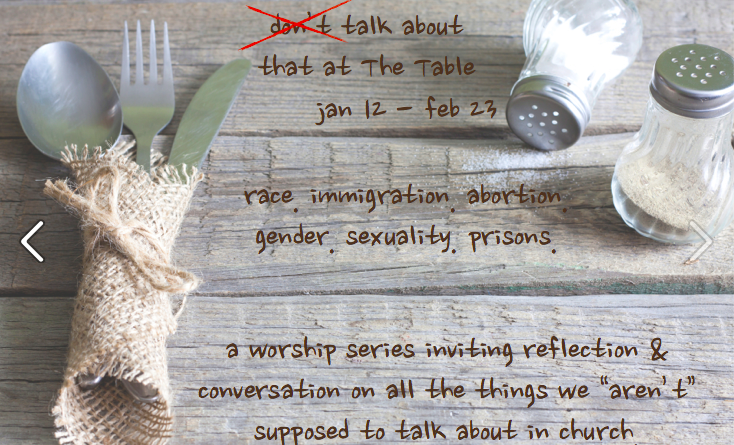We continue our worship series, Don’t Talk About That at The Table; with reflection this coming week on gender.
Outline
January 12: United Methodist Social Principles (Acts 10.34-43)
January 19: Race (Matthew 5.38-48)
January 26: Immigration (1 Corinthians 1.10-18)
February 2: Abortion (Micah 6.1-8)
February 9: Gender (Ephesians 5.22-24 & Galatians 3.28)
February 16: Sexuality (Romans 1.26-27 & Ruth 1.16-17)
February 23: Prisons (Hebrews 13.3)
This Sunday will invite deeper reflection on gender and faith. The United Methodist Social Principles includes this statement, ¶ 161.E Women and Men: We affirm with Scripture the common humanity of male and female, both having equal worth in the eyes of God. We reject the erroneous notion that one gender is superior to another, that one gender must strive against another, and that members of one gender may receive love, power, and esteem only at the expense of another. We especially reject the idea that God made individuals as incomplete fragments, made whole only in union with another. We call upon women and men alike to share power and control, to learn to give freely and to receive freely, to be complete and to respect the wholeness of others. We seek for every individual opportunities and freedom to love and be loved, to seek and receive justice, and to practice ethical self-determination. We understand our gender diversity to be a gift from God, intended to add to the rich variety of human experience and perspective; and we guard against attitudes and traditions that would use this good gift to leave members of one sex more vulnerable in relationships than members of another.
What feelings, memories, and responses emerge for you in reading this statement?
Biblical expectations regarding gender and gender roles are not univocal. Take time to read these two seemingly contradictory statements attributed to Paul: Ephesians 5.22-24 & Galatians 3.28.
How do you respond to the very different ways these two biblical texts appear to address gender and gender roles?


0 Comments